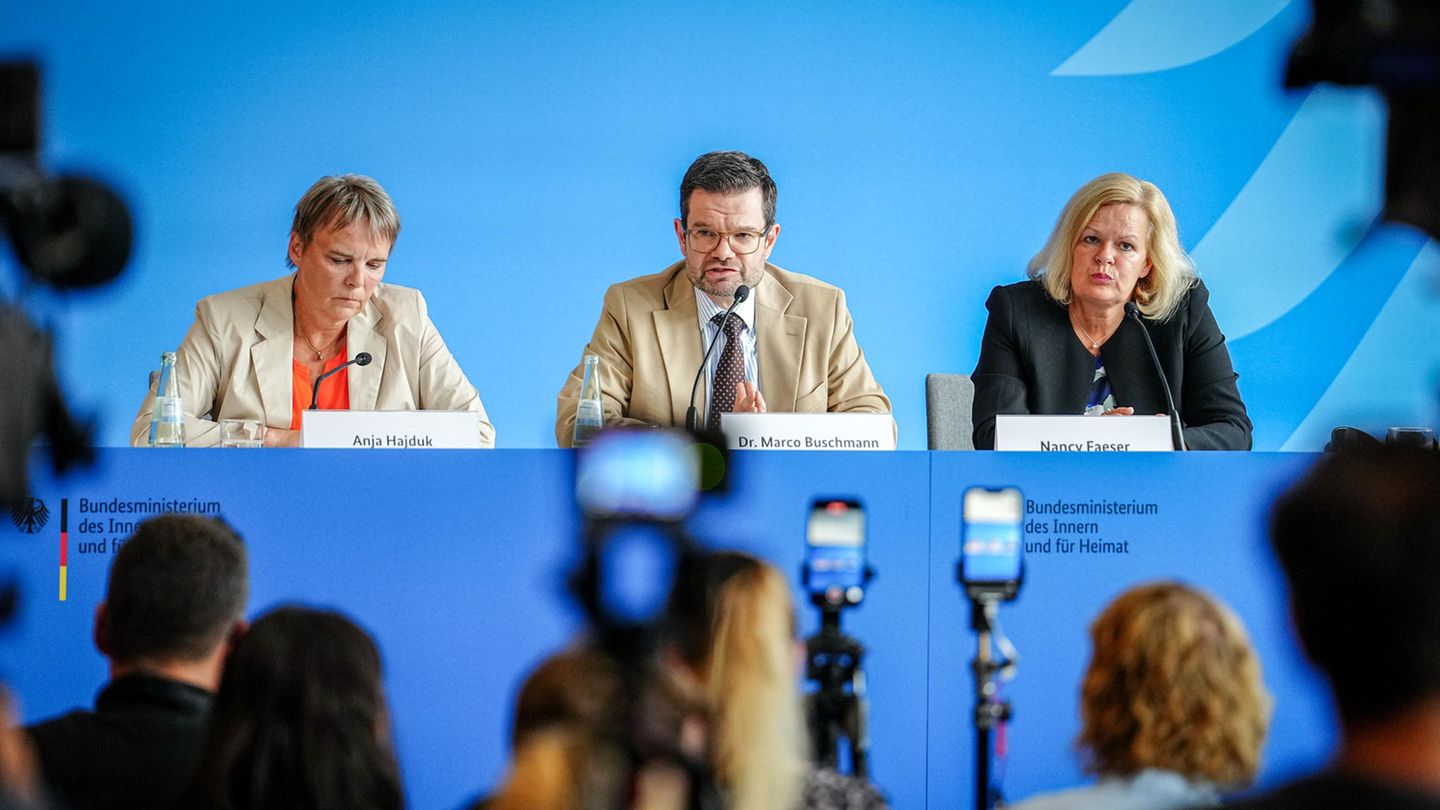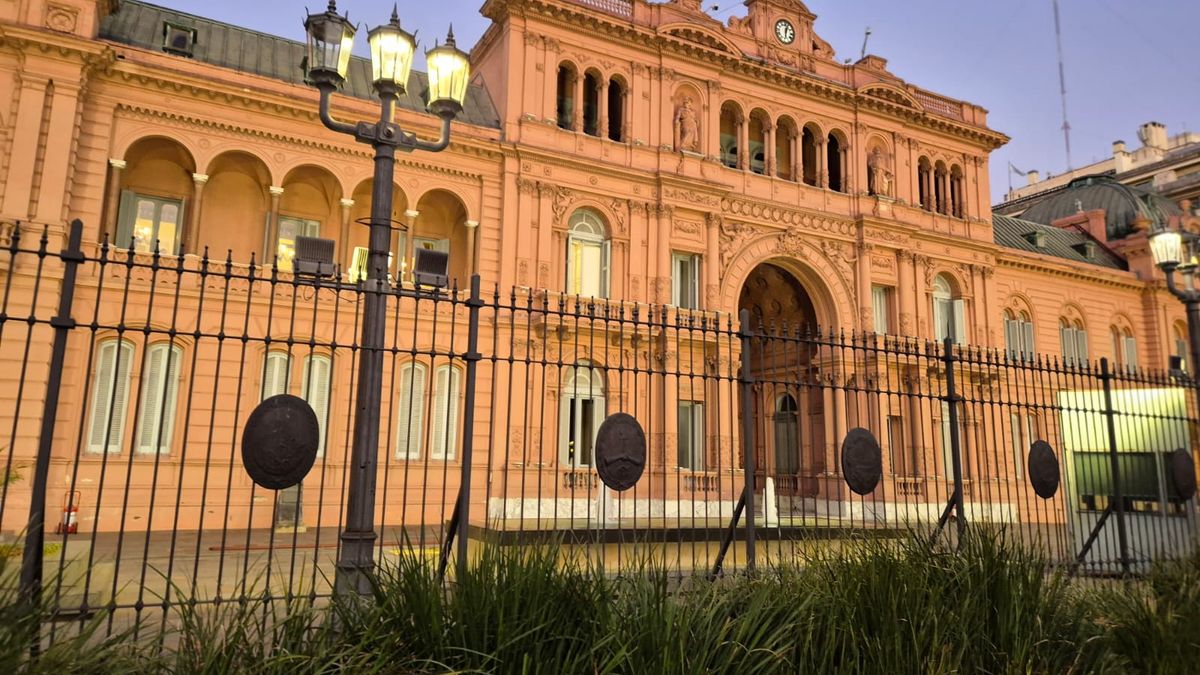Is this a liberating move? Shortly before the state elections, the traffic light coalition is presenting a far-reaching package of measures. The most important points at a glance.
The traffic light coalition wants to “Security package” shortly before the state elections, send a signal of toughness and determination after the fatal knife attack in Solingen. Gun laws are to be tightened by banning knives, the powers of security authorities are to be expanded and some drastic legal adjustments are to be made in asylum policy – up to a complete exclusion of benefits for so-called “Dublin refugees”.
In a press conference called at short notice on Thursday afternoon, Interior Minister Nancy Faeser (SPD) spoke of “far-reaching” and “hard” steps, Justice Minister Marco Buschmann (FDP) of “appropriate consequences”the security situation “appropriate” These became necessary after the suspected Islamist-motivated terrorist attack, added Anja Hajduk, State Secretary in Robert Habeck’s (Greens) Ministry of Economic Affairs, who presented the package of measures on behalf of the Vice Chancellor. The security package was put together in the past few days.
Tightening of gun laws – “Facial recognition” comes
A general ban on contact with “dangerous switchblades” in the gun law, it says in the catalogue of measures. The paper is available to the star According to this, only certain professions and groups of people, such as hunters or craftsmen, should be exempted under certain conditions.
In addition, a “absolute knife ban” at folk festivals, sporting events, trade fairs, exhibitions, markets or similar public events. To this end, Section 42 Paragraph 1 of the Weapons Act (WaffG) will be amended accordingly and a statutory knife ban will be created by federal law, so that no authorization from the state government is required. Justified exceptions will therefore still be possible, provided they are necessary for the purpose of the event (catering, markets, showmen). The states will be authorized to introduce absolute knife bans in crime-ridden locations such as train stations. Knife bans are also planned in public transport, and in long-distance transport, uniform nationwide regulations are planned for all carriers (rail, long-distance bus, etc.). The federal police will be given the authority to carry out random checks regardless of suspicion.
“Extremists must not be allowed to acquire weapons”it continues. Consequently, the requirements for a firearms license are to be increased by also asking the Federal Police, the Federal Criminal Police Office and the Customs Criminal Investigation Office when someone applies for a firearms license or the reliability of an applicant is checked.
Measures should also be taken against “violent Islamism” the investigative authorities, in compliance with the AI Regulation and data protection requirements, are empowered to carry out biometric comparisons of generally publicly accessible Internet data (“Facial recognition”) should be permitted. This should make it easier to identify suspects or wanted persons. The automated analysis of police data by the BKA and the Federal Police will also be made possible by AI support, within the legally permissible framework set by the Federal Constitutional Court, for example.
Stricter rules for refugees
The federal government is planning far-reaching tightening of asylum policy, not least in the area of asylum. According to initial findings, the suspected perpetrator in Solingen is a Syrian refugee who entered Germany via Bulgaria. According to EU law (keyword: Dublin Regulation), Bulgaria would have been responsible for the man. However, the German authorities failed to transfer him. A heated debate has been going on ever since. With the new package, the federal government is also trying to finally get off the defensive.
“Anyone who is not entitled to protection in Germany must leave our country more quickly”said Interior Minister Faeser. Asylum seekers who travelled to their home country without a compelling reason – such as a funeral – “refugee status or subsidiary protection status should be revoked”Refugees from Ukraine are not affected by this. Meanwhile, “with high pressure” that deportations of criminals and terrorist threats to Afghanistan and Syria are now possible again. Returns to these two countries are currently suspended.
The threshold for a particularly serious interest in deportation is to be lowered if the crime was committed using a weapon or other dangerous tool. The grounds for exclusion from asylum and refugee status are also to be tightened. The establishment of a “Dublin Task Force” of the federal and state governments, “all process steps” of the Dublin procedure and increase the number of returns.
“Dublin refugees” will no longer receive social benefits, i.e. refugees who have already been registered in another EU country. These people should “be excluded from receiving benefits”said Interior Minister Faeser. However, all those affected will be treated humanely. No one will starve, assured the SPD politician.
This year, the Federal Government intends to present the legal provisions for the reform of EU asylum law (CEAS) to Parliament and to start negotiations on further migration agreements and cooperation “emphatically” drive forward.
Both Faeser and Buschmann advocated that the measures “implemented as soon as possible” The package of measures still needs to be passed by the Bundestag and Bundesrat.
The traffic light coalition wants to demonstrate not only determination, but also unity: Interior Minister Faeser, for example, had been planning to tighten gun laws for some time, but the FDP in particular had reservations about this. “Facial recognition” was controversial for a long time. After the knife attack in Solingen, especially just a few days before the state elections in Saxony and Thuringia, the pressure to act was obviously great. Opposition leader Friedrich Merz (CDU) accused Chancellor Olaf Scholz (SPD) of losing control of the country.
Source: Stern
I have been working in the news industry for over 6 years, first as a reporter and now as an editor. I have covered politics extensively, and my work has appeared in major newspapers and online news outlets around the world. In addition to my writing, I also contribute regularly to 24 Hours World.




